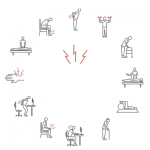Dr. Stoller said all of these medications are underutilized, with buprenorphine the most studied in this regard. To dispense it, physicians need a waiver. “The studies all show the same thing,” he said. “The initial induction can be intimidating for people, because you can get precipitated withdrawal starting people on a partial agonist who are dependent on a full agonist. They’re also concerned about poor compliance with treatment and whether there are counseling treatments available.”
A Treatment Model
In Baltimore, Dr. Stoller is involved with an integrative approach called collaborative opioid prescribing, which encourages physicians to get waivers to prescribe buprenorphine. Comprehensive treatment in the program includes evaluation, induction and counseling. After they’re stabilized, patients are referred for medication to the program’s hubs, usually primary care physicians. During periods of instability for patients, counseling and urinalysis monitoring are increased, and the program can resume dosing medication when appropriate.
Dr. Stoller said this may be a model for a way forward.
“The thing I love about this model the most is that my patients are now motivated to go to their primary care provider appointments,” he said. “Because if they don’t, they’re not getting their prescription. And so they’re finally getting their chronic medical problems addressed.”
Thomas R. Collins is a freelance writer living in South Florida.
Reference
- Clark R, Samnaliev M, Baxter J, et al. The evidence doesn’t justify steps by state medicaid programs to restrict opioid addiction treatment with buprenorphine. Health Aff (Millwood). 2011 Aug;30(8):1425–1433.



